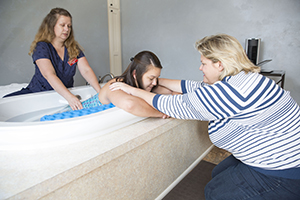Certified Nurse-Midwives Deliver Care to Meet All Women’s Needs
 Certified nurse-midwives (CNM) are an integral part of women’s care. With high rates
of cesarean sections and skyrocketing health care costs, midwives are resurging to
bring healthy, physiological birth back as the standard delivery method. Ninety-six
percent of CNMs provide services in hospitals.
Certified nurse-midwives (CNM) are an integral part of women’s care. With high rates
of cesarean sections and skyrocketing health care costs, midwives are resurging to
bring healthy, physiological birth back as the standard delivery method. Ninety-six
percent of CNMs provide services in hospitals.
Texas Tech University Health Sciences Center’s (TTUHSC) Certified Nurse-Midwifery program, is the only state-supported midwifery graduate program in the state of Texas. The program’s blended format brings together both online courses for convenience and in-class and clinical work for hands-on experience. For CNM candidate Meagan Whitehurst, it’s the right combination to give the education she needed to care for patients.
“We have a lot of interaction with patients, especially with prenatal and delivery,” Whitehurst said. “Women want that personal health care. Midwifery uses evidence-based practice and patients really like having a personal relationship with their provider. That relationship with their midwife helps to reduce fear associated with women’s care, especially for first time mothers.”
Providing care and guidance throughout pregnancy and birth is just part of the range of services offered by today’s CNMs. TTUHSC School of Nursing Nurse-Midwifery Program in Graduate Studies educates CNM candidates to care for women throughout their lives. While graduates have world-wide opportunities, many find careers in Texas, where 90 percent of the state’s counties are medically underserved
“Midwifery is about empowering women,” Whitehurst said. “The field is reducing costs and improving outcomes for women and infants.”
Midwife means “with woman” in Old English. Today’s CNMs provide care for women of all ages — from teenage years through menopause and beyond. In fact, many women visit a midwife for all their women’s health needs before, during and after childbirth.
“Many people do not realize how highly educated today’s midwives are,” Director of the Nurse-Midwifery Program, Rebecca Burpo, DNP, CNM, said. “Or they believe that midwives only know about delivering babies.”
Burpo educates registered nurses at the graduate level to become advanced practitioners. CNMs work as part of an inter-professional team within the health care system. Many of the team’s services overlap, however, there are areas where specific providers have unique expertise. CNMs are specialists in normalcy and typically do not handle extreme pathologies. Their specialty works to keep women healthy throughout their lives by focusing on preventative measures, such as well-woman exams, immunizations, health education, primary care and minor gynecologic issues. Burpo said the midwifery relationship with women is a partnership that guides women through their health care options.
“By providing access to practitioners who are expert in the areas of preventive, normal care that all women need, it frees up those practitioners who are expert in pathology to focus on women with major complications,” Burpo said. “If we integrate our health systems so that there is an adequate consultation, collaboration and referral mechanism in place, it will meet the needs of all women.”
The U.S. is currently seeing a higher demand for midwives. According to the American College of Nurse-Midwives, half of the counties in the U.S. are without an OB/GYN and 56 percent are without a CNM. Even in dense populations, most women still travel more than 90 minutes to meet with a women’s health specialist. This may be hard for many women to do during their pregnancy, and the solution is to have more women’s health care providers to meet the demand of a growing population.
 According to the Bureau of Labor Statistics, the majority of midwives are centered
in states with large rural communities. In the latest Center for Disease Control and
Prevention statistics, the number of infant deaths was 23,440, which equals to 596.1
deaths per 100,000 births. Eight percent of infants are born below weight, and 9.6
percent are born prematurely, and the lack of women’s care providers may account for
these high numbers.
According to the Bureau of Labor Statistics, the majority of midwives are centered
in states with large rural communities. In the latest Center for Disease Control and
Prevention statistics, the number of infant deaths was 23,440, which equals to 596.1
deaths per 100,000 births. Eight percent of infants are born below weight, and 9.6
percent are born prematurely, and the lack of women’s care providers may account for
these high numbers.
Midwives also are needed internationally. According to the World Health Organization (WHO) latest State of the World’s Midwifery report, 289,000 women throughout the world died from birth complications. A case study out of Bangladesh found that just 500 CNMs could reduce maternal mortality by more than 80 percent, decrease infant mortality by 75 percent and save more than 36,000 lives in the span of a 30-year career. For graduates interested in global health this is an excellent opportunity to effect meaningful change in the world.
CNMs are able to provide care to their newborns through the first four weeks of life, making their services invaluable to rural areas and developing nations. Throughout the world, an estimated 3 million infants die within the first month of life. Having qualified CNMs to care for newborns can cut down on the infant mortality rate significantly. Seventy-eight percent of countries in the world do not have enough trained midwives to meet the demands of their population.
“There are so many places in the world that use midwives,” TTUHSC Nurse Practitioner Studies Associate Dean and Department Chair Emily Merrill, Ph.D., APRN, said. “They look at mental health, physical health and family health. CNMs help women plan their families, but also give health assessments to all women for a variety of issues. They may be screening for ovarian cancer, breast cancer and endometrial cancer. They can help ensure the detection of issues that could have bad outcomes.
“Our hope is to have graduates that can fulfill women’s health care and primary care needs in rural communities.” Merrill said. “They are a great asset to all communities, but are invaluable to those lacking specialists in women’s care. It is a challenge to graduate enough candidates to keep up with the high demand.”
The WHO states 87 percent of essential care for women and newborns can be performed by a CNM. This makes midwives a primary source for care in developing countries, and access to a CNM can prevent and reduce maternal and infant morbidities. In the U.S., nurse-midwives are advanced practice registered nurses collaborating with other care providers to give the patient the best avenue of care.
“CNMs work autonomously in providing care within their scope of practice,” Burpo said. “When there is a medical problem, they consult, work together with or refer care to an appropriate provider. This is just like a situation where a woman is seeing her OB-GYN physician and then develops a heart problem. That would be outside the scope of practice for an OB-GYN, so the OB-GYN would consult, collaborate or refer to a cardiologist.”
Not all CNMs work in clinics and hospitals. Birthing centers and homebirth are beginning to rise, as a new generation of expectant mothers looks to birth babies on their own terms. Because CNMs are educated to attend women in hospitals, birthing centers and homes, low-risk women are able to have a choice in choosing their desired birthing method.
Burpo stressed that homebirths with CNMs have very specific guidelines for acceptance and transfer criteria if a problem starts to develop. CNMs also bring an extensive array of medical equipment and emergency medications with them to homebirths.
The midwifery track at TTUHSC educates nurses in providing the best practices for women’s health care. After receiving a bachelor’s degree in nursing, R.N.s can apply for the master’s program in nurse-midwifery at TTUHSC. A year of experience in working with birthing women is preferred before starting in the midwifery track courses. By providing high quality options for shared decision-making, CNMs assist women in building their families and adopting a healthy lifestyle in a secure environment.
Related Stories
Celebrating Veterans: TTUHSC’s General Martin Clay’s Legacy of Service and Leadership
From his initial enlistment in the Army National Guard 36 years ago to his leadership in military and civilian health care management roles, Major General Martin Clay’s career has been shaped by adaptability, mission focus and service to others.
Texas Tech University Health Sciences Center School of Nursing Named Best Accelerated Bachelor of Science in Nursing Program in Texas
The TTUHSC School of Nursing Accelerated Bachelor of Science in Nursing (BSN) program has been ranked the No. 1 accelerated nursing program in Texas by RegisteredNursing.org.
TTUHSC Names New Regional Dean for the School of Nursing
Louise Rice, DNP, RN, has been named regional dean of the TTUHSC School of Nursing on the Amarillo campus.
Recent Stories
The John Wayne Cancer Foundation Surgical Oncology Fellowship Program at Texas Tech University Health Sciences Center Announced
TTUHSC is collaborating with the John Wayne Cancer Foundation and has established the Big Cure Endowment, which supports the university’s efforts to reduce cancer incidence and increase survivability of people in rural and underserved areas.
TTUHSC Receives $1 Million Gift from Amarillo National Bank to Expand and Enhance Pediatric Care in the Panhandle
TTUHSC School of Medicine leaders accepted a $1 million philanthropic gift from Amarillo National Bank on Tuesday (Feb. 10), marking a transformational investment in pediatric care for the Texas Panhandle.
Texas Tech University Health Sciences Center Permian Basin Announces Pediatric Residency Program Gift
TTUHSC Permian Basin, along with the Permian Strategic Partnership and the Scharbauer Foundation, Feb. 5 announced a gift that will fund a new pediatric residency.
